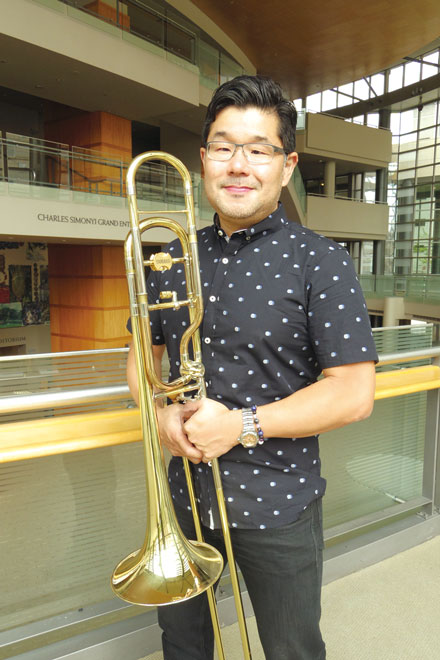By Sophie Yuu Hachimura
For The North American Post
The Seattle Symphony will start its 2016-2017 season this weekend. As one of three Japanese musicians in the local orchestra, Ko-ichiro Yamamoto will perform as the principal trombone. Known as one of the foremost Japanese trombonists of his generation, he has a 20-year career in the United States as the first Japanese brass player in major American orchestras. Living in Seattle with his wife, who is a violin teacher, and a 14-year-old son, Yamamoto spoke about his career and work lifestyle.
–20 years have passed since your first position in the United States. What do you think of your career?
Ko-ichiro Yamamoto (KY): “In 1996, I got the position of 2nd Trombone at the Metropolitan Opera Orchestra in New York. I played there for 10 years. In 2005, I came here as the principal trombone of the Seattle Symphony. Already 11 years passed! I didn’t think I’d be here for such a long time. Seattle is a wonderful city; there is beautiful sea, mountains, lakes, and blue skies. Being close to Japan is also a good point, because I have many occasions to work there. The long season of rain and winter is sometimes tough, but I can cope with it by going skiing.
“When I was in NY, I waited a lot. That was because operas have many pieces without trombones. However, I had to stay there. So I had terribly long work hours but fewer chances to play. On the other hand, the Seattle Symphony is a symphony orchestra. Trombones in symphonies have a lot of time to play, and the role is also tough. We put heavy stress on our mouths to make sounds and then become quite injured. It is like metal fatiguing. As you know, metal is broken after bending and unbending many times. For delicate control of the sound, I have to be very careful for my lips not to burn out.”
–You are invited as a guest principal by many orchestras of all over the world, like NY Philharmonic. Do you find any differences between them?
KY: “Definitely. Especially in the strings, I find many differences in the playing styles. The ways of starting sounds, timing of musical notes, and so on. Each orchestra’s take differs with the same words. For example, the word loud or forte, in the New York Philharmonic sounds like rumbles of the earth, but the Chicago Symphony Orchestra sounds like a great thick wall. I think one reason for these differences is education. I grew up in Japan until high school and studied at the Liszt Academy in Hungary and the Juilliard School in New York. In Europe, on the one hand, the goal is to play the works “naturally” through a deep understanding of the cultures. In America, on the other hand, a mechanical and rational approach towards playing is the most important.
“When I play as a guest principal I have to catch these differences immediately. Since I am a principal, I have to lead the other players. There’s no time for uncertainty. Visiting other orchestras gives me many opportunities to improve my playing. Great conductors and musicians stimulate me a lot. I brush myself up as a principal and learn a lot of shades of sounds. I’d like to bring all of these experiences to my ideal hometown Seattle.”
–Are there any changes recently, among your travels all over the world?
KY: “Playing everywhere in the world is very fascinating for me, but these days I’ve started to feel a little bit exhausted traveling. Once I played 3 concertos in 3 cities with different orchestras in a week. I didn’t feel as good as I previously had in concerts, and I didn’t feel enjoyment. Just a couple of months before, I traveled to Japan twice in a month! Because that was during the Seattle Symphony season, I felt really stressed. Then I thought that I cannot cope with such terrible schedules. Now I’m reconsidering my work lifestyle after some troubles with my health.
“However, I found something for me lately. I mainly played in the Seattle Symphony, visited some orchestras, and also played concertos in Japan. Audiences of those concertos were very enthusiastic, and I really enjoyed the concerts. Then I realized that if I do what is most suitable for me, audiences enjoy it. Centering myself as a principal trombone and also playing solos or concertos–I think I’m designed for this.”
–How do you keep up your health?
KY: “Two years ago, I stopped drinking alcohol. My body is in pretty good shape and my mind is very clear. I go to the gym more than 3 times a week, and I don’t stop exercising even when traveling. Exercise makes breathing smooth and sharpens the mind. I maintain my health by focusing on the exact time of a concert. And I don’t force myself to power through jet lag.
“Playing instruments healthily is crucial for every musician. Bodies are heavily stressed by playing the trombone. So I feel the stress of the whole body, not just one part of the body. Everything, good or bad, is reflected in my playing. To keep myself in good shape is important for the enjoyment of music. I play the trombone every day, even if it’s a day off. These are not practices, but more like maintenance. I gauge my health through my trombone playing, remembering the best condition, and control myself to get there.
“Every orchestra in the world is progressing everyday, as is the Seattle Symphony. Also, my body and ears are changing everyday. In response to the world’s progress, I must constantly be aware of myself, maintain basic skills, and brush up my musical awareness.”
More information about the Seattle Symphony can be found at www.seattlesymphony.org.
[Editor’s Note] Sophie Yuu Hachimura is a Japanese music critic. and can be reached at yuu. hachimura@gmail.com.




